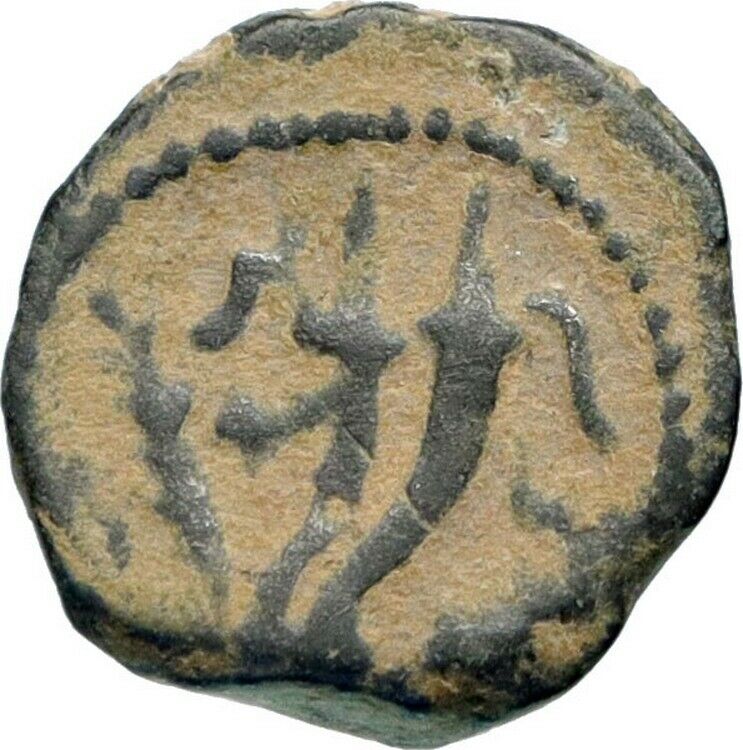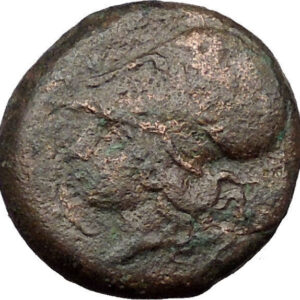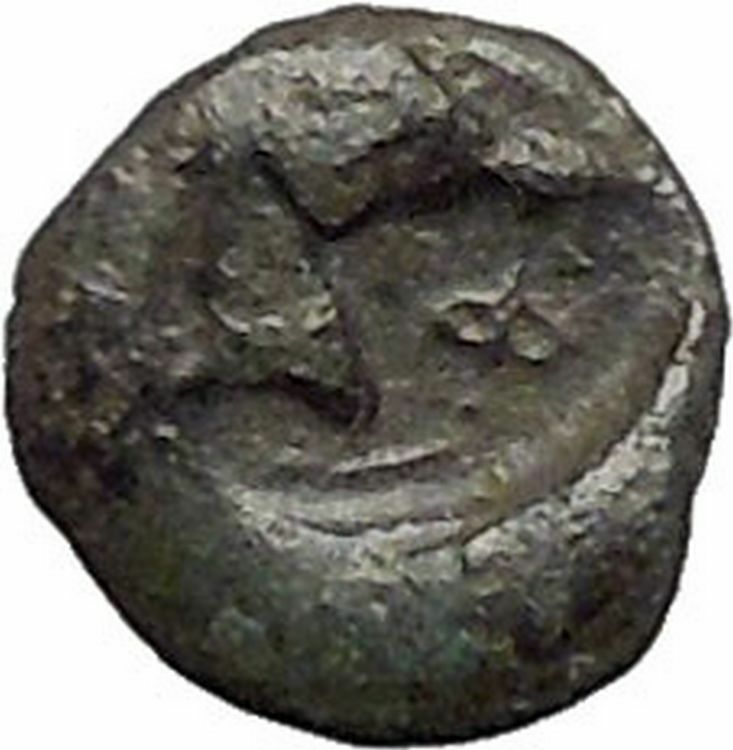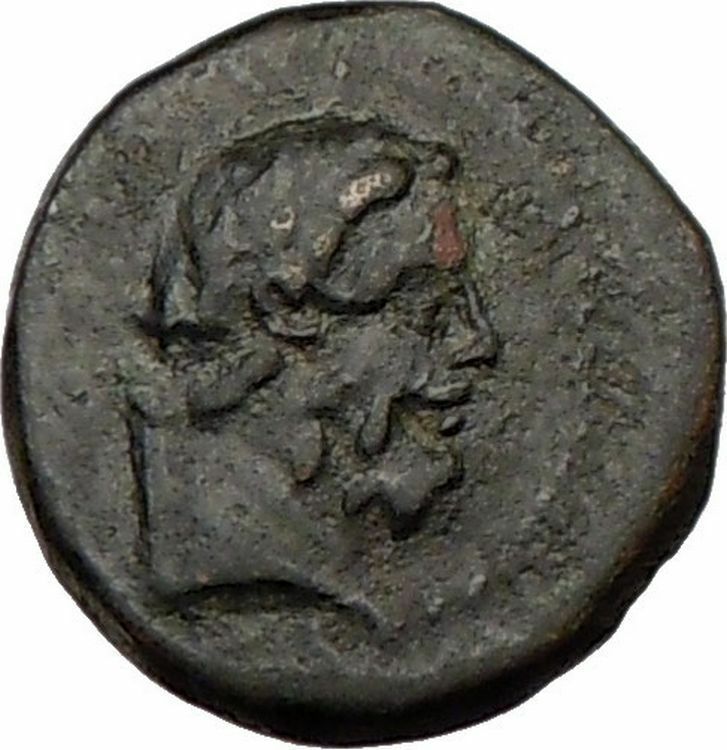|
Greek city of Antioch on the Orontes in Seleukis and Pieria
Bronze 20mm (9.1 grams) Dated IA, struck 56/55 B.C.
Reference: HGC 9, 1371
Laureate head of Zeus right.
ANTIOXEΩN ΤΗΣ / MHTPOΠOΛΕΩΣ, Zeus Nikephoros seated left holding Nike and scepter;
‘Pompeian’ era date IA in exergue.
Founded by Seleukos I circa 300 B.C. with Greek and Macedonian settlers brought from the destroyed city of Antigoneia on the Orontes. The city was named after Seleukos’ father with the purpose of being a western capital to guard against the northern expansion of the Ptolemaic kingdom. Eventually as many territories were lost, Antioch became the only capital of the Seleukid kingdom. Pompey the Great deposed the last king Antiochos XIII in 64 B.C. The Romans then made it a capital of a new Roman province and the seat of the Roman governors. There were temples of Olympian Zeus, Apollo in Daphne, hippodrome (built under the Seleukids and embellished by the Romans) and colonnaded main streets (being a gift from Herod the Great). It was an important center for the arts and learning.
You are bidding on the exact item pictured, provided with a Certificate of Authenticity and Lifetime Guarantee of Authenticity.
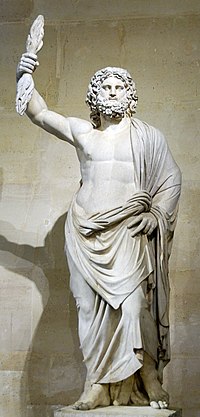 In the ancient Greek religion, Zeus was the “Father of Gods and men” (πατὴρ ἀνδρῶν τε θεῶν τε) who ruled the Olympians of Mount Olympus as a father ruled the family. He was the god of sky and thunder in Greek mythology. His Roman counterpart is Jupiter and Etruscan counterpart is Tinia. In the ancient Greek religion, Zeus was the “Father of Gods and men” (πατὴρ ἀνδρῶν τε θεῶν τε) who ruled the Olympians of Mount Olympus as a father ruled the family. He was the god of sky and thunder in Greek mythology. His Roman counterpart is Jupiter and Etruscan counterpart is Tinia.
Zeus was the child of Cronus and Rhea, and the youngest of his siblings. In most traditions he was married to Hera, although, at the oracle of Dodona, his consort was Dione: according to the Iliad, he is the father of Aphrodite by Dione. He is known for his erotic escapades. These resulted in many godly and heroic offspring, including Athena, Apollo and Artemis, Hermes, Persephone (by Demeter), Dionysus, Perseus, Heracles, Helen of Troy, Minos, and the Muses (by Mnemosyne); by Hera, he is usually said to have fathered Ares, Hebe and Hephaestus.
As Walter Burkert points out in his book, Greek Religion, “Even the gods who are not his natural children address him as Father, and all the gods rise in his presence.” For the Greeks, he was the King of the Gods, who oversaw the universe. As Pausanias observed, “That Zeus is king in heaven is a saying common to all men”. In Hesiod’s Theogony Zeus assigns the various gods their roles. In the Homeric Hymns he is referred to as the chieftain of the gods.
His symbols are the thunderbolt, eagle, bull, and oak. In addition to his Indo-European inheritance, the classical “cloud-gatherer” also derives certain iconographic traits from the cultures of the Ancient Near East, such as the scepter. Zeus is frequently depicted by Greek artists in one of two poses: standing, striding forward, with a thunderbolt leveled in his raised right hand, or seated in majesty.
 In Greek mythology, Nike was a goddess who personified victory, also known as the Winged Goddess of Victory. The Roman equivalent was Victoria. Depending upon the time of various myths, she was described as the daughter of Pallas (Titan) and Styx (Water) and the sister of Kratos (Strength), Bia (Force), and Zelus (Zeal). Nike and her siblings were close companions of Zeus, the dominant deity of the Greek pantheon. According to classical (later) myth, Styx brought them to Zeus when the god was assembling allies for the Titan War against the older deities. Nike assumed the role of the divine charioteer, a role in which she often is portrayed in Classical Greek art. Nike flew around battlefields rewarding the victors with glory and fame. In Greek mythology, Nike was a goddess who personified victory, also known as the Winged Goddess of Victory. The Roman equivalent was Victoria. Depending upon the time of various myths, she was described as the daughter of Pallas (Titan) and Styx (Water) and the sister of Kratos (Strength), Bia (Force), and Zelus (Zeal). Nike and her siblings were close companions of Zeus, the dominant deity of the Greek pantheon. According to classical (later) myth, Styx brought them to Zeus when the god was assembling allies for the Titan War against the older deities. Nike assumed the role of the divine charioteer, a role in which she often is portrayed in Classical Greek art. Nike flew around battlefields rewarding the victors with glory and fame.
Nike is seen with wings in most statues and paintings. Most other winged deities in the Greek pantheon had shed their wings by Classical times. Nike is the goddess of strength, speed, and victory. Nike was a very close acquaintance of Athena, and is thought to have stood in Athena’s outstretched hand in the statue of Athena located in the Parthenon. Nike is one of the most commonly portrayed figures on Greek coins.
Names stemming from Nike include amongst others: Nicholas, Nicola, Nick, Nikolai, Nils, Klaas, Nicole, Ike, Niki, Nikita, Nika, Niketas, and Nico.
<phis monetary="" reformation="" included="" in="" the="" introduction="" of=""
|





 In the ancient Greek religion, Zeus was the “Father of Gods and men” (πατὴρ ἀνδρῶν τε θεῶν τε) who ruled the Olympians of Mount Olympus as a father ruled the family. He was the god of sky and thunder in Greek mythology. His Roman counterpart is Jupiter and Etruscan counterpart is Tinia.
In the ancient Greek religion, Zeus was the “Father of Gods and men” (πατὴρ ἀνδρῶν τε θεῶν τε) who ruled the Olympians of Mount Olympus as a father ruled the family. He was the god of sky and thunder in Greek mythology. His Roman counterpart is Jupiter and Etruscan counterpart is Tinia. In Greek mythology, Nike was a goddess who personified victory, also known as the Winged Goddess of Victory. The Roman equivalent was Victoria. Depending upon the time of various myths, she was described as the daughter of Pallas (Titan) and Styx (Water) and the sister of Kratos (Strength), Bia (Force), and Zelus (Zeal). Nike and her siblings were close companions of Zeus, the dominant deity of the Greek pantheon. According to classical (later) myth, Styx brought them to Zeus when the god was assembling allies for the Titan War against the older deities. Nike assumed the role of the divine charioteer, a role in which she often is portrayed in Classical Greek art. Nike flew around battlefields rewarding the victors with glory and fame.
In Greek mythology, Nike was a goddess who personified victory, also known as the Winged Goddess of Victory. The Roman equivalent was Victoria. Depending upon the time of various myths, she was described as the daughter of Pallas (Titan) and Styx (Water) and the sister of Kratos (Strength), Bia (Force), and Zelus (Zeal). Nike and her siblings were close companions of Zeus, the dominant deity of the Greek pantheon. According to classical (later) myth, Styx brought them to Zeus when the god was assembling allies for the Titan War against the older deities. Nike assumed the role of the divine charioteer, a role in which she often is portrayed in Classical Greek art. Nike flew around battlefields rewarding the victors with glory and fame.

